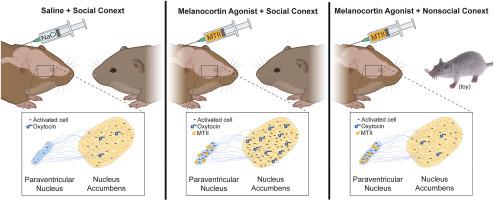Neuropharmacology ( IF 4.7 ) Pub Date : 2024-01-20 , DOI: 10.1016/j.neuropharm.2024.109848 Charles L. Ford , Anna A. McDonough , Kengo Horie , Larry J. Young

|
Social deficits are debilitating features of many psychiatric disorders, including autism. While time-intensive behavioral therapy is moderately effective, there are no pharmacological interventions for social deficits in autism. Many studies have attempted to treat social deficits using the neuropeptide oxytocin for its powerful neuromodulatory abilities and influence on social behaviors and cognition. However, clinical trials utilizing supplementation paradigms in which exogenous oxytocin is chronically administered independent of context have failed. An alternative treatment paradigm suggests pharmacologically activating the endogenous oxytocin system during behavioral therapy to enhance the efficacy of therapy by facilitating social learning. To this end, melanocortin receptor agonists like Melanotan II (MTII), which induces central oxytocin release and accelerates formation of partner preference, a form of social learning, in prairie voles, are promising pharmacological tools. To model pharmacological activation of the endogenous oxytocin system during behavioral therapy, we administered MTII prior to social interactions between male and female voles. We assessed its effect on oxytocin-dependent activity in brain regions subserving social learning using Fos expression as a proxy for neuronal activation. In non-social contexts, MTII only activated hypothalamic paraventricular nucleus, a primary site of oxytocin synthesis. However, during social interactions, MTII selectively increased oxytocin-dependent activation of nucleus accumbens, a site critical for social learning. These results suggest a mechanism for the MTII-induced acceleration of partner preference formation observed in previous studies. Moreover, they are consistent with the hypothesis that pharmacologically activating the endogenous oxytocin system with a melanocortin agonist during behavioral therapy has potential to facilitate social learning.
中文翻译:

社会背景下的黑皮质素激动以催产素依赖性方式选择性激活伏隔核
社交缺陷是许多精神疾病(包括自闭症)的衰弱特征。虽然耗时的行为疗法具有一定的效果,但目前还没有针对自闭症社交缺陷的药物干预措施。许多研究尝试使用神经肽催产素来治疗社交缺陷,因为它具有强大的神经调节能力以及对社交行为和认知的影响。然而,利用独立于环境而长期施用外源性催产素的补充范例的临床试验失败了。另一种治疗范式建议在行为治疗期间通过药理学激活内源性催产素系统,通过促进社会学习来增强治疗效果。为此,黑皮质素受体激动剂,如Melanotan II(MTII),可诱导中枢催产素释放并加速伙伴偏好的形成,这是草原田鼠社会学习的一种形式,是有前途的药理学工具。为了模拟行为治疗期间内源性催产素系统的药理学激活,我们在雄性和雌性田鼠之间进行社交互动之前施用 MTII。我们使用 Fos 表达作为神经元激活的代表,评估了它对促进社会学习的大脑区域催产素依赖性活动的影响。在非社交环境中,MTII 仅激活下丘脑室旁核,这是催产素合成的主要部位。然而,在社交互动过程中,MTII 选择性地增加了伏隔核的催产素依赖性激活,伏隔核是社交学习的关键部位。这些结果表明了先前研究中观察到的 MTII 诱导的伴侣偏好形成加速的机制。此外,它们与以下假设一致:在行为治疗期间用黑皮质素激动剂从药理上激活内源性催产素系统有可能促进社会学习。



























 京公网安备 11010802027423号
京公网安备 11010802027423号